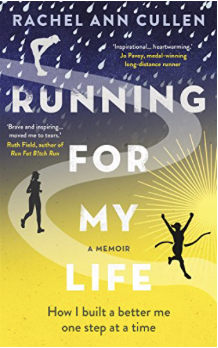Book Review: Running For My Life by Rachel Ann Cullen
- Lynn Findlay
- Aug 26, 2018
- 3 min read

Running for my life: A memoir. How I built a better me one step at a time
This is Rachel’s honest, determined and inspirational account of her journey (so far) through childhood, adolescence, adulthood and parenthood, and how running has been interwoven in these life transitions and relationships.
In essence this is not a book just about running, but a book about life and its challenges, and how within these challenges running impacts, shapes and supports life. Yet, it is also a book about goals and reaching those goals through the support and inclusivity of the running community.
Why I chose it
I was eager to read this book as it encapsulates my recent life journey, being a new-ish runner who runs for self-care and mental health, and as a therapist (in training) with an interest in running therapy, as well an aspiring writer (with a longer way to go!).
Through reading Running for My Life I gained determination, a sense of barriers coming down and thoughts that change is possible, as well as gentle smiles of recognition from some of Rachel’s early childhood memories of family and personality traits that I saw in my own family.
Who should read it
If you enjoy running journeys you will devour it; if you enjoy stories of real life achievements you will be warmed and fulfilled, and if you want to feel the impact of family and relationships you will not be disappointed.
It is useful for therapists?
I first read it from a running perspective, eager to absorb the race highs and lows and everything about the London Marathon; I was gobbling the bling and the atmosphere as I wanted to share the vicarious elation of crossing the finish line. I re-read it from a therapist’s perspective, slower, with meaning and becoming entranced by the emotions in Rachel’s words rather than her km/splits.
Reading for meaning didn’t take away the running highs but highlighted the equal pride and excitement that I could imagine Rachel experiencing as she wrote.
Therapists will be drawn to Rachel’s fragile sense of self-worth as a child, the weight of her experiences living with a parent with mental ill health and then experiencing depression and body dysmorphia as a teenager and young adult; “The world shrank as I grew”.
Throughout Rachel’s life are relationships; with family, partners, food and running; memories are interspersed with diary entries and comparisons with modern day context; If only there was parkrun!
Who would benefit from reading it?
If you want to know when to pause, stop, change direction or just keep going. Rachel has an insightful ability to know the difference between these at times in her life; and even when she felt Prozac was in control.
In a Goffman-esqe style Rachel was and is acutely aware of the presentation of her ‘self’ in everyday life; what was hidden and what needed fixing internally before it could be on public show.
My thoughts
Rachel described her desire to run; to move, like cabin fever. I can relate to this. My body told me to start moving two years ago and after barely breaking a sweat for the first half of my life I began to run. And slowly distances that were impossible became possible, at faster speeds and then the unexpected bonus of being part of one of friendliest communities and a change in identity.
Recommend to clients?
Yes most definitely for the underlying messages, strength, determination and change perspective. If clients are new to running or thinking about starting running, everyone’s journey, speed, distances and achievements are personal. Have an own goal whatever these may be. For me 10min miles are not a chatty pace! Achievable now but I have to remember to breathe!
Running for My Life can be purchased here and at all major book stores
Author's Bio
Lynn Findlay is a counsellor in training at The Academy SPACE in Sheffield, with an interest in running therapy. She is also a social worker for The Foster Care Cooperative delivering training on fostering issues. You can contact Lynn via Twitter


















Comments